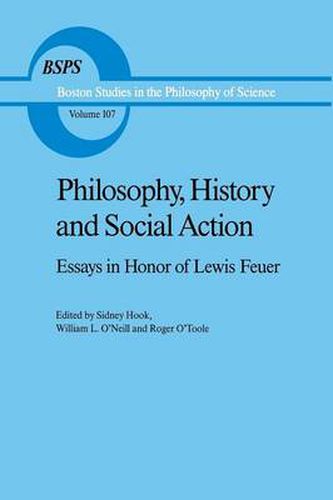Readings Newsletter
Become a Readings Member to make your shopping experience even easier.
Sign in or sign up for free!
You’re not far away from qualifying for FREE standard shipping within Australia
You’ve qualified for FREE standard shipping within Australia
The cart is loading…






This title is printed to order. This book may have been self-published. If so, we cannot guarantee the quality of the content. In the main most books will have gone through the editing process however some may not. We therefore suggest that you be aware of this before ordering this book. If in doubt check either the author or publisher’s details as we are unable to accept any returns unless they are faulty. Please contact us if you have any questions.
Two articles by Lewis Feuer caught my attention in the ‘40s when 1 was wondering, asa student physicist, about the relations of physics to philosophy and to the world in turmoil. One was his essay on 'The Development of Logical Empiricism’ (1941), and the other his critical review of Philipp Frank’s biography of Einstein, ‘Philosophy and the Theory of Relativity’ (1947). How extraordinary it was to find so intelligent, independent, critical, and humane a mind; and furthermore he went further, as I soon realized when I looked for his name on other publications. I recall arguing with myself over his exploration of ‘Indeterminacy and Economic Development’ (1948), and even more when I read his ‘Dialectical Materialism and Soviet Science’ (1949). More papers, and then the fascinating, sometimes irritating, always insightful, books. His monograph on Psychoanalysis and Ethics 1955, the beautiful sociological and humanist study of Spinoza and the Rise of Liberalism (1958), his essays on ‘The Social Roots of Einstein’s Theory of Relativity’ (1971) together with the book on Einstein and the Genera tions of Science (1974), the splendid reader from the works of Marx and Engels, Basic Writings on Politics and Philosophy (1959) which was a major text of the ‘60s, the stimulating essays on the social formation which seems to have been required for a modern scientific movement to develop, set forth most convincingly in The Scientific Intellectual (1963).
$9.00 standard shipping within Australia
FREE standard shipping within Australia for orders over $100.00
Express & International shipping calculated at checkout
This title is printed to order. This book may have been self-published. If so, we cannot guarantee the quality of the content. In the main most books will have gone through the editing process however some may not. We therefore suggest that you be aware of this before ordering this book. If in doubt check either the author or publisher’s details as we are unable to accept any returns unless they are faulty. Please contact us if you have any questions.
Two articles by Lewis Feuer caught my attention in the ‘40s when 1 was wondering, asa student physicist, about the relations of physics to philosophy and to the world in turmoil. One was his essay on 'The Development of Logical Empiricism’ (1941), and the other his critical review of Philipp Frank’s biography of Einstein, ‘Philosophy and the Theory of Relativity’ (1947). How extraordinary it was to find so intelligent, independent, critical, and humane a mind; and furthermore he went further, as I soon realized when I looked for his name on other publications. I recall arguing with myself over his exploration of ‘Indeterminacy and Economic Development’ (1948), and even more when I read his ‘Dialectical Materialism and Soviet Science’ (1949). More papers, and then the fascinating, sometimes irritating, always insightful, books. His monograph on Psychoanalysis and Ethics 1955, the beautiful sociological and humanist study of Spinoza and the Rise of Liberalism (1958), his essays on ‘The Social Roots of Einstein’s Theory of Relativity’ (1971) together with the book on Einstein and the Genera tions of Science (1974), the splendid reader from the works of Marx and Engels, Basic Writings on Politics and Philosophy (1959) which was a major text of the ‘60s, the stimulating essays on the social formation which seems to have been required for a modern scientific movement to develop, set forth most convincingly in The Scientific Intellectual (1963).